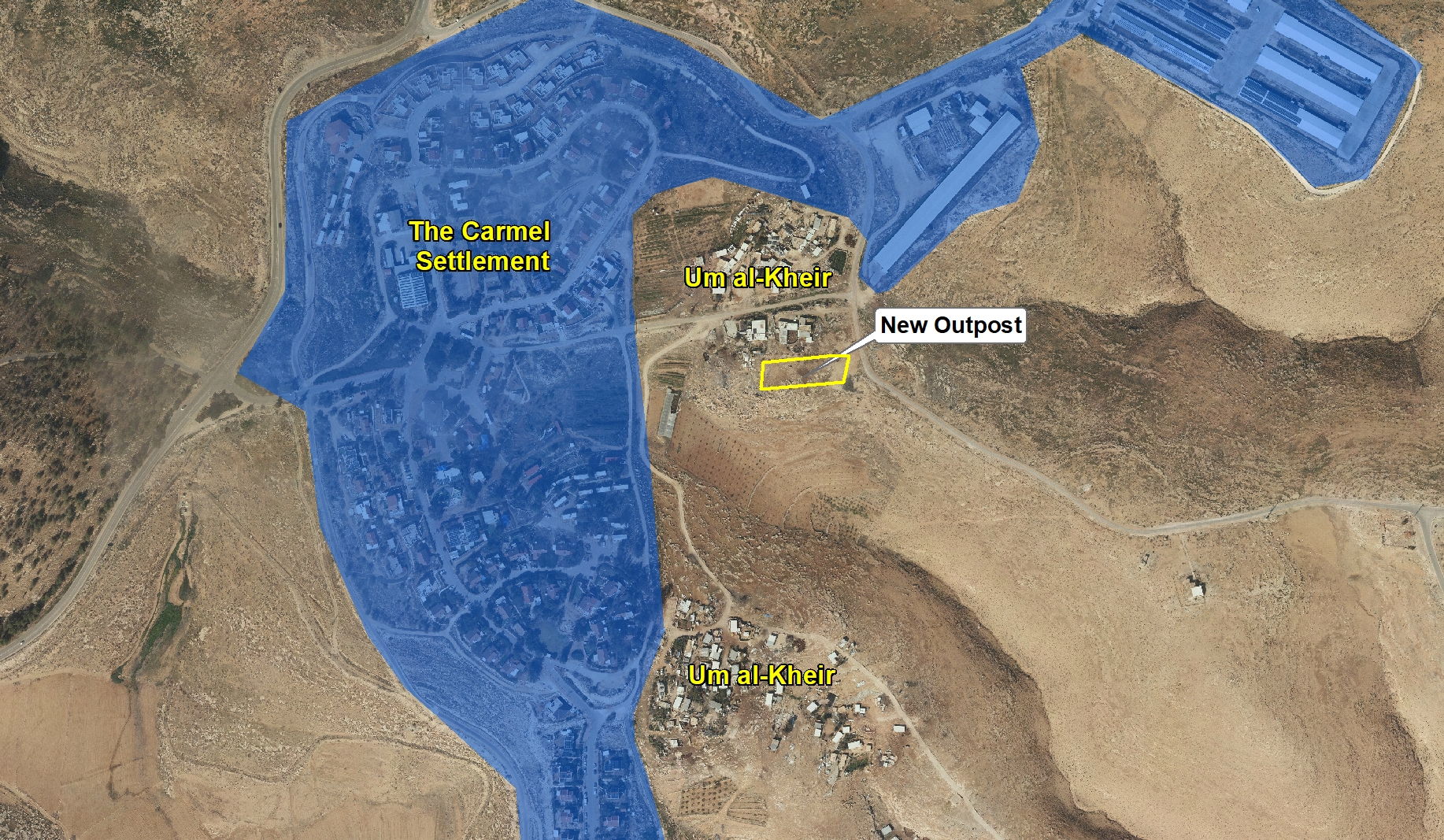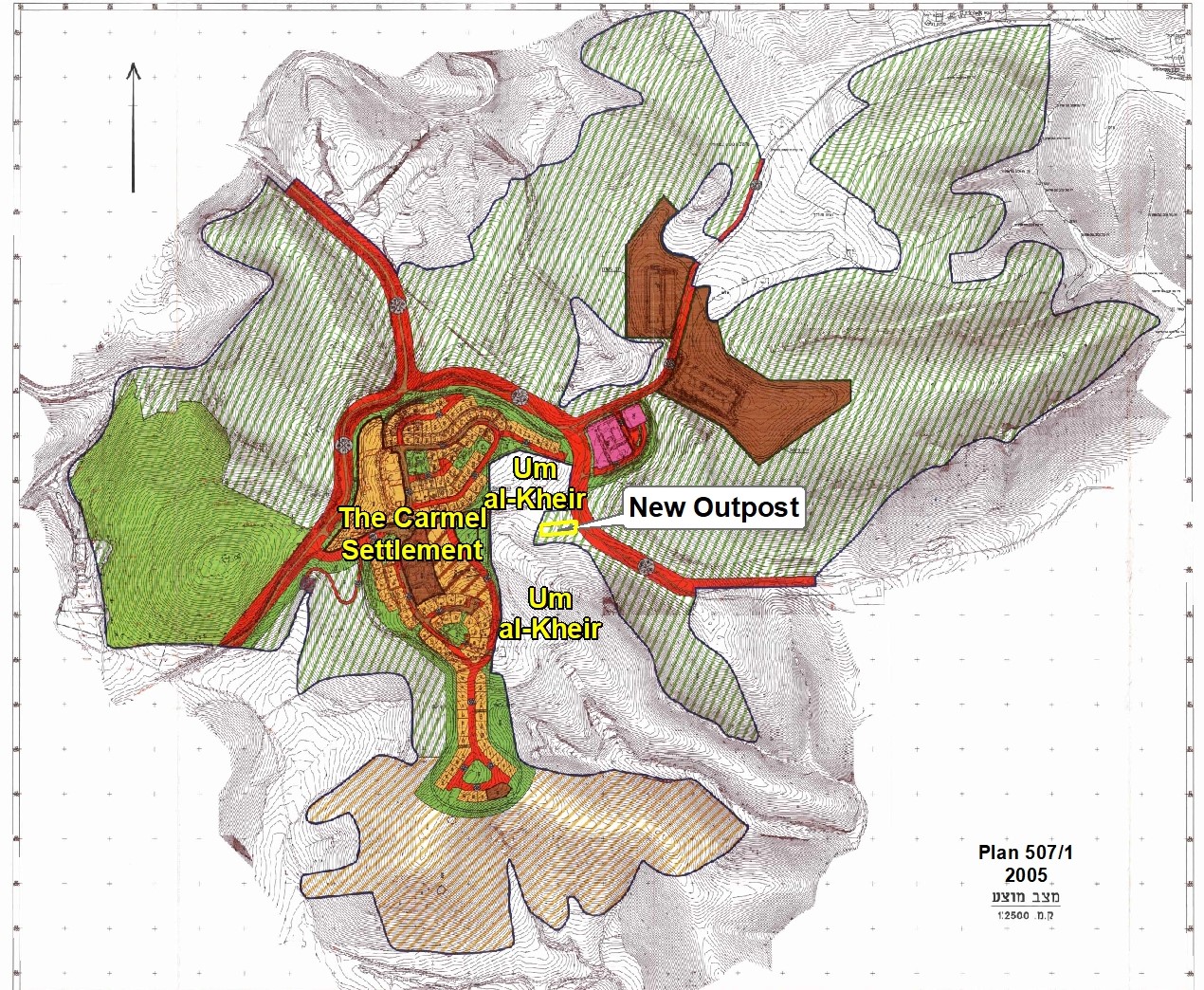Settlers overnight established a new outpost inside the Palestinian village of Um al-Kheir in the South Hebron Hills. They placed four caravans just a few meters from the village homes, in violation of the zoning plan in force in the area, and prepared the ground for at least two more caravans.
In the past month, settlers’ bulldozers worked between the village homes in preparation for the outpost. During the work, one of the settlers killed village resident Awdah Hathaleen, who had been standing dozens of meters away documenting what was happening.
The bulldozer also broke the village’s water pipe, and settlers prevented residents from repairing it. Only after the villagers exerted legal pressure was the pipe fixed.
1. Settlers established a new outpost tonight at the heart of Um al-Kheir Palestinian village.
This was what they were working on when the settler Yinon Levi killed Awdah Hathalleen a month ago.
…/2 https://t.co/ozeLRuPhUT pic.twitter.com/QTgiUkKBpN
— Peace Now (@peacenowisrael) August 27, 2025
Peace Now: This is the peak of the Israeli government’s mistreatment of the residents of Um al-Kheir. After decades of home demolitions, the denial of permits and infrastructure, and escalating violence from settlers and the army, comes the harsh blow of establishing a permanent outpost in the middle of the village. The settlers who erected the illegal outpost overnight did so on behalf of the authorities, with direct support from the Har Hevron Regional Council, the army, the police and the government. Since the formation of the Smotrich-Ben Gvir government, about 90 Palestinian communities have been displaced by violent settlers who established nearby outposts. The aim of the new outpost in Um al-Kheir is clear: to drive the residents from their land.

Um al-Kheir is a village of about 200 Bedouin residents originally from the Negev. Their families were forced to leave their land in the Negev after 1948 and moved to the South Hebron Hills, where they purchased land and settled in Masafer Yatta during the Jordanian rule of the West Bank. After 1967, the Israeli authorities in the occupied territories never recognized Um al-Kheir as a legal place of residence. The authorities refuses to grant building permits and considers all the structures there “illegal”. According to OCHA (the UN Office for the Coordination of Humanitarian Affairs), in the past 15 years Israel has demolished 56 structures in the village, 14 of them in the past year and a half alone.
In the early 1980s, Israel declared about 4,000 dunams in the area as “state land” and allocated them to the Settlement Division for the establishment of the Carmel and Maon settlements. The settlement of Carmel was built adjacent to the lands of Um al-Kheir. In 2005, the Higher Planning Council approved Plan 507/1 for Carmel, which included in
the settlement’s planned area about 2,200 dunams of the open lands around it. About seven dunams of this land lie directly inside the village of Um al-Kheir.

According to the plan, the entire open area (marked on the map in green and white stripes) is designated as open agricultural land, not residential. On these seven dunams (which Israel declared as “state land” by a draconian
interpretation of the Ottoman Land Law), settlers have in recent months harassed the residents with increasing frequency.
In February this year, settlers held a large tree-planting event in cooperation with the regional council and planted trees adjacent to the residents’ homes. Later, they placed a shipping container and a picnic table on the land, about 40 meters from the village homes.
One settler, Shimon Atiya, who had established the Shorashim Farm outpost not far from the area, began entering the yard of one family, harassing and bothering the residents. In proceedings filed against him by the family with the assistance of Peace Now, he claimed that the land had been given to him by the Carmel settlement for
grazing and that his presence in the family’s yard was an exercise of his right to the land. Eventually, the court issued a restraining order barring Atiya from the family’s home.
About a month ago, the settler Yinon Levi arrived with a bulldozer and began preparing the land for caravans. During the work, when residents tried to prevent him from encroaching on private land, he shot and killed Awdah Hathaleen.

